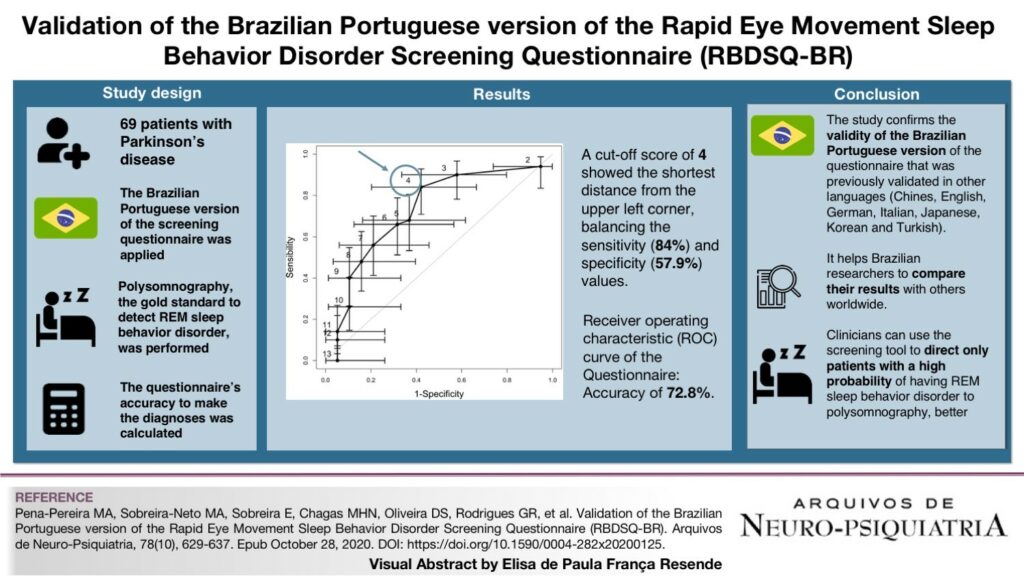Elisa de Paula França Resende, neurologista, Universidade Federal de Minas Gerais -EBSERH, Belo Horizonte MG, Brazil.
 Rapid Eye Movement (REM) sleep behavior disorder is a common condition in Parkinson’s disease (SOBREIRA-NETO, M. A. et al.). REM sleep is marked by a loss of muscular tone, so we do not move our arms and legs while dreaming. Patients with REM sleep behavior disorder do not lose their muscular tone and end up enacting their dreams. For example, dreaming about a fight can lead to punches and kicks to the bed partner. Depending on the enactment, the patient and the partner can have serious injuries.
Rapid Eye Movement (REM) sleep behavior disorder is a common condition in Parkinson’s disease (SOBREIRA-NETO, M. A. et al.). REM sleep is marked by a loss of muscular tone, so we do not move our arms and legs while dreaming. Patients with REM sleep behavior disorder do not lose their muscular tone and end up enacting their dreams. For example, dreaming about a fight can lead to punches and kicks to the bed partner. Depending on the enactment, the patient and the partner can have serious injuries.
To diagnose REM sleep behavior disorder, polysomnography is necessary. However, this exam is expensive and is not ubiquitously available. Therefore, applying questionnaires to screen for REM sleep behavior disorder can help to determine who will benefit most from polysomnography. Researchers from the University of São Paulo in Ribeirão Preto sought to validate the Brazilian Portuguese version of a screening questionnaire with 10 items to diagnose REM sleep behavior disorder in patients with Parkinson’s disease.
The study titled “Validation of the Brazilian Portuguese version of the Rapid Eye Movement Sleep Behavior Disorder Screening Questionnaire (RBDSQ-BR)” was conducted at the university itself and evaluated 69 patients with Parkinson’s disease that underwent the screening questionnaire and the polysomnography. Thus, the researchers compared the screening questionnaire’s ability to diagnose REM sleep behavior disorder with the diagnosis obtained by polysomnography, which is the gold standard. They found that the screening questionnaire was able to correctly diagnose 72.8% of patients with REM sleep behavior disorder. By applying the screening questionnaire, clinicians can avoid unnecessary exams and better allocate medical resources.

Image: Elisa de Paula França Resende.
First, the researchers translated the questionnaire to Portuguese following a rigorous protocol that involved three bilingual translators. Then the questions were translated back to English by an English teacher to confirm the accuracy of the translation. Then the patients were carefully evaluated for sleep behavior disorders and Parkinson’s disease as well as polysomnography. The researchers found that 72.5% of the patients with Parkinson’s disease had REM sleep behavior disorder per the polysomnography. The screening questionnaire was able to give an accurate diagnosis in 72.8% of the cases. Answering “yes” to 4 out of 10 items was optimum for balancing sensitivity and specificity. Sensitivity and specificity are key aspects in determining a test’s diagnostic accuracy. The cut-off score of 4 had a sensitivity of 84% and a specificity of 57.9%, meaning that the screening questionnaire was positive in 84% of patients with REM sleep behavior disorder and negative in 57.9% of patients without the disorder.
The relatively low specificity seems to be caused by other sleep disorders that cause excessive motor activity during sleep such as restless leg syndrome, obstructive sleep apnea syndrome, periodic limb movements, and narcolepsy. Those disorders were also present in some patients with REM sleep behavior disorder and rendered positive answers in items indicating limb movements in the questionnaire.
The authors also investigated which items individually and combined had the greatest power to diagnose REM sleep behavior disorder. The item with the highest sensitivity (86%) was: “I sometimes have very vivid dreams”. Other items that showed discriminatory power were: “My dreams frequently have an aggressive or action-packed content.”, “I have or had the following phenomena during my dreams: speaking, shouting, swearing, laughing loudly and sudden limb movements, “fights”. Combining the above items also significantly discriminated the groups of Parkinson’s disease patients with and without REM sleep behavior disorder.
The screening questionnaire used by the authors was validated in many other languages: Chinese, English, German, Italian, Japanese, Korean and Turkish. The study by Pena-Pereira et al, published at Arquivos de Neuro-Psiquiatria, confirms the validity of the Brazilian Portuguese version of the questionnaire for predicting the diagnosis of REM sleep behavior disorder in patients with Parkinson’s disease. Having a validated instrument in Portuguese helps Brazilian researchers to compare their results with others worldwide. Furthermore, clinicians can be confident about using a screening questionnaire that is largely used and reliable, based on studies conducted in other parts of the world. By applying a screening questionnaire, health professionals can direct only patients with a high probability of having REM sleep behavior disorder to polysomnography, better-allocating health resources.
References
SOBREIRA-NETO, M. A. et al. High Frequency of Sleep Disorders in Parkinson’s Disease and Its Relationship with Quality of Life. European neurology [online]. 2017, vol. 78 [viewed 26 January 2021]. https://doi.org/10.1159/000481939. Available from: https://www.karger.com/Article/Abstract/481939
To read the articles, acess
PENA-PEREIRA, M. A. et al. Validation of the Brazilian Portuguese version of the Rapid Eye Movement Sleep Behavior Disorder Screening Questionnaire (RBDSQ-BR). Arq. Neuro-Psiquiatr. [online]. 2020, vol.78, n.10 [viewed 26 January 2021]. https://doi.org/10.1590/0004-282×20200125. Available from: http://ref.scielo.org/xrb83d
External links:
Arquivos de Neuro-Psiquiatria – ANP: https://www.scielo.br/anp
Undergraduate Committee Ribeirão Preto Medical School: https://cg.fmrp.usp.br
Como citar este post [ISO 690/2010]:
















Recent Comments